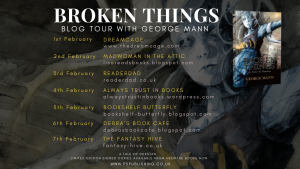Author Spotlight – George Mann (BROKEN THINGS)
George Mann is a Sunday Times bestselling novelist and scriptwriter. He’s the creator of the Wychwood supernatural mystery series as well as the popular Newbury & Hobbes and Tales of The Ghost series, two of which are in development as television shows. He’s written comics, novels and audio dramas for properties such as Star Wars, Doctor Who, Sherlock Holmes, Judge Dredd and Dark Souls. He’s currently part of the writer’s room on a forthcoming genre television show.
George lives near Grantham, UK, with his wife, children and two noisy dogs. He loves mythology and folklore, Kate Bush and chocolate. He is constantly surrounded by tottering piles of comics and books.
Welcome to the Hive, George. Let’s start with the basics: dazzle us with an elevator pitch! Why should readers check out your work?
Crikey! You’re keen!
Well, to start with the basics: I’m a U.K. based novelist and scriptwriter who has written bestselling Doctor Who and Star Wars books, and I’m perhaps best known for my steampunk adventure series, Newbury & Hobbes, or my supernatural crime novels, Wychwood and Hallowdene.
My latest book, Broken Things, is a little bit of a departure from my usual stuff but is something I’ve been wanting to write for a very long time—an out and out fantasy story. It’s steeped in strange mythology and folklore and follows three very different pilgrims on their journey to face a newly reborn goddess. One wants her to resurrect their dead brother, another seeks the answer to a fundamental question at the heart of his religious order and the third wants to challenge her in battle in the hope she might give him an honourable death. We follow the challenges they face on their journeys (theft, highwaywomen, monstrous beasts, sacrifice and more), and their gradual convergence before the goddess herself.
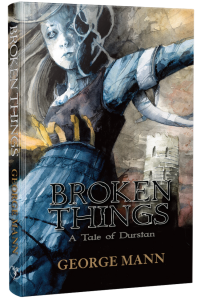 It sounds like a great read!
It sounds like a great read!
Okay, time to escalate things: reality warps and you suddenly find yourself leading a D&D-style party through a monster-infested dungeon. What character class are you, and what’s your weapon of choice?
Definitely a Ranger, but of the darker, moodier variety, such as Drizzt or Geralt the Witcher. I’m generally a pretty chatty, happy fellow, so I think if reality was warping and I had a chance to do a bit of dungeon delving for real, I’d definitely want to bring out my dark side!
As for weapons—it would have to be some ancient, mythical sword. Not necessarily a magic one, but something with a long history, a proper story. A blade that had character. The sort of sword that people whisper stories about around their campfires in the dead of night.
When you’re not trawling through dungeons, how do you like to work? (For example, in silence, with music, or serenaded by the damned souls of a thousand dead shrimps? Do you prefer to type or to hand-write? Intense planner or is your system more organic?) Tell us a little bit about your writing method!
I don’t tend to have music playing when I’m working, although I have occasionally been known to have a film score on in the background, particularly if I’m looking to capture a particular pace or tone. More recently I’ve been switching one of my screens over to show a crackling log fire, which is a really lovely ambient sound to have playing while I’m hunched over the keyboard, especially in winter.
I definitely prefer to type over hand drafting, although I scribble a lot of notes. I have a notebook per project, and also make use of a LOT of post-it notes.
I plan pretty meticulously these days, working out the story and all the characters in advance, but I also trust myself to follow my nose if I start going off track. Cool things can happen that way, and if you’ve got a map, you know where you need to get back to when you’ve finished exploring.
I’ve also recently invested in a Freewrite, and I’m enjoying the distraction free approach to getting a first draft down without being drawn to check what’s happening on social media or the like.
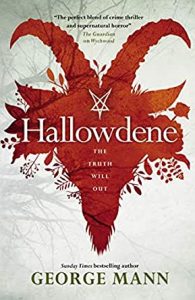 Social media is the bane of productivity!
Social media is the bane of productivity!
What (or who) are your most significant fantasy influences?
I had a fairly traditional fantasy upbringing, with early exposure to Tolkien and CS Lewis, all before the age of seven. Later I discovered the Dragonlance Chronicles and the Drizzt books and as a young teen I devoured as many of them I could lay my hands on. I also found Conan around the same time and used to love visiting the local newsagents to pick up the old Sphere paperbacks with the lurid covers.
Later still came some of the books and authors who’ve really, deeply influenced my writing—Susan Cooper’s Dark is Rising sequence and Alan Garner’s The Owl Service.
More recently I’ve come to adore the works of Steven Erikson and Ian Cameron Esselmont. Their jointly realised Malazan universe has been a constant companion through the last few years. I’ve also been loving the work of P Djeli Clark, and M. John Harrison is a perennial favourite.
Are there any writers or creators whom you’d love to collaborate with?
Lots! I enjoy collaborative writing and have done a fair amount of it in recent years, either with my friend and colleague Cavan Scott, or with a fellow scriptwriter, John French, with whom I write a lot of animation scripts.
I also collaborate a lot with artists working on comics.
I’d love to work more closely with Daniele Serra, the artist who illustrated the cover of Broken Things. If he could be tempted to illustrate a whole book, I’d be ecstatic. His work is such an inspiration.
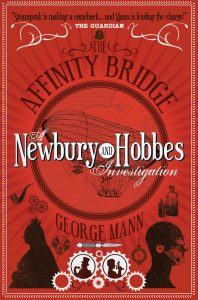 Every writer encounters stumbling blocks, be it a difficult chapter, challenging subject matter or just starting a new project. How do you motivate yourself on days when you don’t want to write?
Every writer encounters stumbling blocks, be it a difficult chapter, challenging subject matter or just starting a new project. How do you motivate yourself on days when you don’t want to write?
It can be hard sometimes, of course, and I do try to be kind to myself if I’m really struggling. I find taking a walk or even a shower can make a huge difference if I’m sitting at the computer feeling stuck in a rut. I also find changing rooms and computers helps—if I’m lacking motivation sitting at my desk, I’ll grab my laptop and go and sit in the conservatory instead. Pre-Covid, that might have been a coffee shop or the like.
The other thing I’ve found helpful is using the pomodoro technique, working intensely in 25-minute bursts. It’s amazing how much you can get done with that laser focus. It’s predicated on the idea that for 25 mins you can ignore everything else and just work. Then you have a short break, before doing it again. If I’m getting distracted, I do a few of those and it often helps to break the mood.
We always appreciate a beautiful book cover! How involved in the process were you? Was there a particular aesthetic you hoped they’d portray?
Yes! In fact, PS Publishing we’re fantastic and asked me for input. I knew they’d worked with Daniele Serra before, and as a fan of his work I knew how perfect it would be for this story. They were more than happy with the idea and Dani thankfully jumped at the idea. We’d worked together before, and we’re keen to do so again.
Dani sent several sketched ideas over and we all chipped in our thoughts and picked the one we finally went with. Dani then worked his magic and turned it into the amazing piece you see now. I couldn’t have been happier with it.
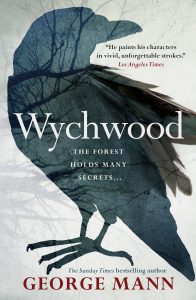 The world shifts, and you find yourself with an extra day on your hands during which you’re not allowed to write. How do you choose to spend the day?
The world shifts, and you find yourself with an extra day on your hands during which you’re not allowed to write. How do you choose to spend the day?
I’d take the dogs for a long walk in the countryside (weather permitting), then spend the rest of the day reading and listening to music. That’s pretty much my perfect day. In normal times, I’d maybe try to see some live music in the evening or play some board games with family and friends. Pretty sedate, really!
One of our favourite questions here on the Fantasy Hive: which fantastical creature would you ride into battle and why?
It may be a cliche, but ever since watching the original Clash of the Titans movie, it would probably be Pegasus. Who wouldn’t want to ride a flying horse?
Although now you come to mention it, I quite like the idea of running into battle riding on the shoulders of a massive troll, too…
Tell us about a book that’s excellent, but underappreciated or obscure.
I think it would have to be Signs of Life by M. John Harrison. It made such an impression on me when it was published in the late 90s. It’s set in the 1980s and is essentially the story of a woman who dreams of becoming a bird, but it’s also a love story, a bleak examination of Thatcherite Britain and a look at the emerging biotech industry. The prose is exquisite and so well observed. Harrison is an absolute master.
Finally, can you tell us a little something about your current work(s) in progress?
I’ve just finished another novella, this time a new Newbury & Hobbes story, set in a manor house during a ‘London particular’—a thick, pea souper fog—where a dinner party goes horribly wrong, the guests find themselves trapped, the staff aren’t quite right, and there are strange clockwork things lurking in the shadows…
Thank you so much for joining us today!
Thanks for having me!
We were the last stop on George’s tour, but be sure to check out the previous stops!
